|
|
|
Sort Order |
|
|
|
Items / Page
|
|
|
|
|
|
|
| Srl | Item |
| 1 |
ID:
189015
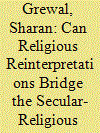

|
|
|
|
|
| Summary/Abstract |
Domestic politics around the globe have become increasingly polarized along secular-religious lines. Recent literature suggests that one way to ease secular-religious tension and gridlock is for religious leaders to offer progressive reinterpretations of religious texts, that might convince religious conservatives to compromise from their seemingly-fixed policy positions. But can everyday citizens deploy religious reinterpretations themselves? We examine this question through a series of citizen debates in Tunisia, in which 602 participants attempted to reach a compromise over two ‘culture wars’ issues. Across both experiments, we find that having secular liberals engage religious conservatives with religious reinterpretations backfired, nearly halving the rate of compromise. Religious reinterpretations produced both defensive conservatives and emboldened liberals, obstructing compromise between them. While scholarship suggests that religious leaders may be able to deploy reinterpretations effectively, our results caution that everyday citizens may not.
|
|
|
|
|
|
|
|
|
|
|
|
|
|
|
|
| 2 |
ID:
189012
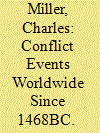

|
|
|
|
|
| Summary/Abstract |
Quantitative datasets of international conflict skew temporally to modern times and geographically and culturally to the West. Yet post–1815 conflicts featuring Western actors are only a small part of the history of warfare. Many scholars have bemoaned the potential selection bias which this introduces to studies of the causes and effects of military conflict, but as yet quantitative datasets which remedy both these temporal and geographic shortcomings have been lacking. Some datasets have expanded the scope of existing offerings temporally and others spatially, while others have attempted to expand both but with an important lack of detail in terms of location, participants, timing and outcomes. This dataset sets out to remedy the deficit. Using military history’s most extensive encyclopedia of conflict events, we have created a dataset of conflict events spanning the globe and a timescale from 1468BC to the invasion of Iraq in 2003, complete with precise geographic coordinates, year, participants and outcome. We demonstrate the promise of this data-set by using it to assess the frequently asserted relationship between conflict history and economic development, combined with Nordhaus’ GECON sub–national wealth data and historical data on population density from the Netherlands Environmental Agency.
|
|
|
|
|
|
|
|
|
|
|
|
|
|
|
|
| 3 |
ID:
189007
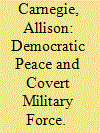

|
|
|
|
|
| Summary/Abstract |
How should we reconcile covert war with normative theories of the democratic peace? Proponents argue that these interventions are consistent with democratic peace theory, as leaders intervene covertly to escape backlash by a public that has internalized liberal norms. Yet we know little about public opinion regarding the covert use of force. Using a survey experiment, we find that respondents are more favorable towards covert interventions against democratic targets than our theories assume, and that even citizens who value transparency the most still wrestle with a trade-off between their normative commitments and the instrumental benefits they perceive covert actions to hold. Our results thus help to explain why American leaders have repeatedly chosen to conduct covert military operations against fellow democracies, and raise important questions about the scope conditions of normative theories of the democratic peace.
|
|
|
|
|
|
|
|
|
|
|
|
|
|
|
|
| 4 |
ID:
189008
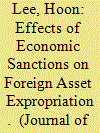

|
|
|
|
|
| Summary/Abstract |
Studies suggest that home countries impose economic sanctions following host state expropriation of home firms. However, and not addressed in the empirical literature, is the possibility that sanctions lead targeted countries to nationalize firms from sender countries. Using bilateral expropriation data from 1985 to 2010, and controlling for endogeneity issues, we find that sanctions significantly increase expropriation risk, encouraging targeted states to inflict pain in a reciprocal manner on sender countries. Expropriations also enable targeted nations to acquire economic assets from foreign firms, undermining the restricting goals of sanctioning states, and provide opportunities for leaders to show political resolve at home by standing up to senders. Our results are robust using monadic or dyadic data and different statistical methods, indicating another sanction-busting strategy used by targeted countries.
|
|
|
|
|
|
|
|
|
|
|
|
|
|
|
|
| 5 |
ID:
189011
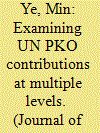

|
|
|
|
|
| Summary/Abstract |
Most empirical studies on states’ personnel contributions to UN peacekeeping operations (PKOs) use a state’s annual contributions as the unit of analysis. A critical problem of the state-level analysis is that it ignores the fact that states have to decide how to distribute these peacekeepers among more than a dozen peacekeeping missions. Ignoring the mission-level decision misses a significant part of states’ UN PKO contributions and could bias our empirical analysis. We propose a two-level model that sees a state’s UN PKO contributions as the interactions between the state-level and mission-level factors. This model is employed to revisit the heatedly debated “reimbursement hypothesis”. Our analysis of the empirical data between 1990 and 2018 shows a mixed relationship between states’ economic development and their UN PKO contributions. We also find that middle-income rather than low-income countries are the most critical providers of UN PKOs since the end of the cold war.
|
|
|
|
|
|
|
|
|
|
|
|
|
|
|
|
| 6 |
ID:
189013
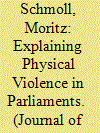

|
|
|
|
|
| Summary/Abstract |
Why do lawmakers resort to physical violence in some parliaments but not in others? Brawls not only constitute a stark break with democratic norms and ideals, they also affect voter perceptions and have been seen as a bellwether for conflict and democratic backsliding. Yet, the phenomenon remains poorly understood. This paper introduces a new, original dataset recording reported incidents of physical fights in parliaments across the globe between 1980 and 2018 that includes almost four times more cases of violence than existing data. Theoretically, we argue that levels of democracy and the composition of parliament should drive violence. The analysis shows that fighting is most common in countries that are neither very autocratic nor very democratic, in fragmented parliaments, and in chambers with slim majorities. The findings have implications for the study of (de-)democratization, political instability, and the design of democratic institutions.
|
|
|
|
|
|
|
|
|
|
|
|
|
|
|
|
| 7 |
ID:
189005
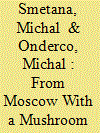

|
|
|
|
|
| Summary/Abstract |
This article presents findings of an original survey experiment on public attitudes toward nuclear use conducted on a representative sample of Russian citizens. We randomly assigned our participants to experimental treatments with vignettes describing a military conflict between Russia and NATO in the Baltics, where Moscow considered a limited nuclear “escalate-to-deescalate” strike to avert defeat. Our findings show that Russians are significantly more averse to nuclear strikes than to the corresponding use of conventional missiles. The participants disapproved similarly of a demonstrative nuclear explosion in an unpopulated area and of nuclear strikes in a more escalated scenario. We also found associations between the moral values of individuals and strike support corresponding to earlier studies in the United States. Finally, our participants reported similar concerns about both nuclear and conventional strikes, with the worry about civilian casualties and the suffering of victims at the top of the list across experimental treatments.
|
|
|
|
|
|
|
|
|
|
|
|
|
|
|
|
| 8 |
ID:
189014
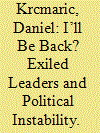

|
|
|
|
|
| Summary/Abstract |
Exile is often considered a useful political solution that can coax violent or unpopular leaders out of power. But these “golden parachutes” may come with a price. Specifically, do exiled leaders increase instability back in their home countries? In this paper, we outline the mechanisms through which exiled rulers can destabilize their home state’s politics and ultimately increase conflict. We present two types of evidence to support the argument. The first is a cross-national analysis that uses our original Leaders in Exile dataset to examine how exiled leaders shape the likelihood of civil conflicts, coups, and protests. The second is a cross-leader analysis designed to minimize inferential concerns by comparing cases where leaders escape into exile with cases where leaders are killed. In both tests, we find that exiled leaders are linked to political instability in their home countries.
|
|
|
|
|
|
|
|
|
|
|
|
|
|
|
|
| 9 |
ID:
189017


|
|
|
|
|
| Summary/Abstract |
Comprehensive peace agreements (CPAs) are the most impactful negotiated settlements ending civil wars, but their implementation varies across post-conflict countries and over time. To explain varying implementation, this study identifies central challenges in CPA implementation and suggests that international third parties are uniquely positioned to overcome them. (1) IGOs with high economic leverage, and (2) prior foreign aid both set incentives that reduce domestic barriers to implementation. Quantitative evidence on the implementation of CPAs from 1989-2015 supports this argument. Both post-conflict countries’ participation in IGOs with high economic leverage and higher volumes of prior foreign aid are associated with higher rates of CPA implementation. Multiple estimation approaches, including instrumental variables, support this finding. Case evidence from the 2007 CPA in Ivory Coast tracks the processes by which IGOs and donors help overcome stakeholder resistance and facilitate implementation. This finding encourages more concerted efforts by policymakers to advance CPA implementation.
|
|
|
|
|
|
|
|
|
|
|
|
|
|
|
|
| 10 |
ID:
189010


|
|
|
|
|
| Summary/Abstract |
Does war affect support for incumbent leaders and parties? The literature is divided with studies reporting negative, positive, or null-effects. Many studies analyze the consequences of foreign intervention, and less is known about the political costs of wars fought close to home. Building on theories of retrospective voting, we theorize that wars inform voters about leader’s competence, and in turn affect mass attitudes and behaviors. Leveraging the unexpected onset of the 1973 Yom Kippur war which interrupted an ongoing Israeli public opinion poll, and voting records from four national elections linked with Israeli military fatality data, we demonstrate that despite the ultimate military victory, the war and its casualties reduced support for incumbent parties and leaders, and increased support for the opposition. By moving beyond foreign interventions, we provide strong evidence that wars over a country’s core territory can be politically costly for incumbent leaders and parties.
|
|
|
|
|
|
|
|
|
|
|
|
|
|
|
|
| 11 |
ID:
189016
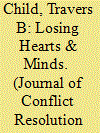

|
|
|
|
|
| Summary/Abstract |
“Hearts and minds” theory contends development aid strengthens community support for counterinsurgents by providing jobs and public goods. Based on field interviews in Kabul, we develop an alternative theoretical framework emphasizing instead the ideological preferences of civilians. In our model, some aid projects are ideologically contentious while others are benign. Given a mix of foreign aid, each civilian supports either the counterinsurgents or rebels, depending on his/her idiosyncratic preferences. In this setting, greater provisions of aid can actually erode community support. Donors therefore calibrate the mix of foreign aid to appease population groups with relatively strong ideological sensibilities. Individual-level analysis based on unique Afghan data substantiates key features of our theory. Benign projects lead to favorable opinions of development, while contentious aid has the opposite effect. Moreover, favorable opinions of development are associated with stronger support for government and counterinsurgents, and weaker support for rebels.
|
|
|
|
|
|
|
|
|
|
|
|
|
|
|
|
| 12 |
ID:
189009
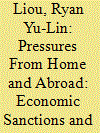

|
|
|
|
|
| Summary/Abstract |
What effect do economic sanctions have on target governments’ response to citizen campaigns? We assert that sanctions as a signal of international support for campaigners alter the bargaining environment between a target state and the campaign in ways that will likely draw more support from citizens and defections from the ruling base. This will in turn incentivize target leaders to be more conciliatory toward domestic campaigns with maximalist goals, especially when such campaigns are nonviolent. Results from a time-series, cross-national data analysis indicate that sanctions, particularly when they are enforced by multiple senders or with high cost, are effective in increasing the success rate of nonviolent campaigns. Given the plethora of sanctions research that points to their inefficacy and adverse effects, we show that sanctions could be an effective tool to extract concessions from governments facing nonviolent campaigns.
|
|
|
|
|
|
|
|
|
|
|
|
|
|
|
|
| 13 |
ID:
189006
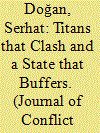

|
|
|
|
|
| Summary/Abstract |
We present a game-theoretic approach to the analysis of the emergence or survival of buffer states. We analyze a two-stage game with three players orderly located on a linear territory, where the player in the middle is passive, and the players on the two ends are aggressive with options to declare war against the others. We conduct an equilibrium analysis and characterize the conditions under which the passive player acts as a buffer state between the aggressive players. We find various equilibrium outcomes, which can be grouped into the following categories: (i) peace with buffer, (ii) peace without buffer, and (iii) the last man standing. Our comparative static analyses reveal valuable insights regarding the factors affecting the existence of buffer states.
|
|
|
|
|
|
|
|
|
|
|
|
|
|
|
|
|
|
|
|
|